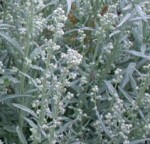 Known by many common names including western mugwort, Louisiana wormwood, and white sagebrush, this rhizomatous perennial is a native of North America including most of the US. It is a member of the aster family, Asteraceae, that also includes daisies, sunflowers, and lettuce. The white hairy stems are branched and carry aromatic silvery leaves two to four inches long, with white woolly undersides and almost hairless topsides. The margins of the leaves are entire rather than dissected like most other artemesias. The small nodding flower heads are yellowish gray and carried in narrow compound panicles in late summer. They are not considered ornamentally attractive and are usually removed as they appear. Although the foliage is very attractive and can be an asset in the garden, the plants tend to spread aggressively by seed and rhizomes and may need to be restrained. A good choice, however, for a sunny, dry difficult area where little else thrives. The generic name, Artemesia refers to the Greek goddess of chastity, the hunt and the moon. The specific epithet, ludoviciana, refers to the Louisiana territory.
Known by many common names including western mugwort, Louisiana wormwood, and white sagebrush, this rhizomatous perennial is a native of North America including most of the US. It is a member of the aster family, Asteraceae, that also includes daisies, sunflowers, and lettuce. The white hairy stems are branched and carry aromatic silvery leaves two to four inches long, with white woolly undersides and almost hairless topsides. The margins of the leaves are entire rather than dissected like most other artemesias. The small nodding flower heads are yellowish gray and carried in narrow compound panicles in late summer. They are not considered ornamentally attractive and are usually removed as they appear. Although the foliage is very attractive and can be an asset in the garden, the plants tend to spread aggressively by seed and rhizomes and may need to be restrained. A good choice, however, for a sunny, dry difficult area where little else thrives. The generic name, Artemesia refers to the Greek goddess of chastity, the hunt and the moon. The specific epithet, ludoviciana, refers to the Louisiana territory.
Type: Herbaceous perennial
Bloom: Small nodding yellowish-gray flower heads carried in narrow compound panicles in late summer
Size: 2-4’ H x 2’ W
Light: Full sun
Soil: Lean to moderately fertile, dry to medium moist, well-drained
Hardiness: Zones 4-9
Care: Prune to 12-18” in early spring before growth begins; shear in summer to shape when necessary; restrain rampant growth when necessary.
Pests and Diseases: None of significance but root rot may occur if soil is too moist and plants may flop if soil is too fertile.
Propagation: Division in late summer or fall; cuttings in late spring and summer
Companion Plants: Ornamental grasses, English lavender, pink cinquefoil, Nepeta, Persian wallflower, yucca, bearded iris
Outstanding Selections:
‘Silver King’ (more compact and darker silver color than species; hardy to zone 3)
‘Silver Queen’ (leaves with deeply cut margins)
‘Valerie Finnis’ (18-24” tall and less aggressive than species)